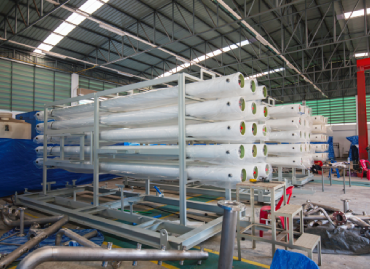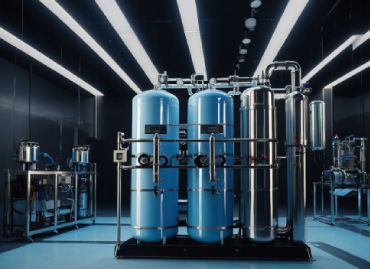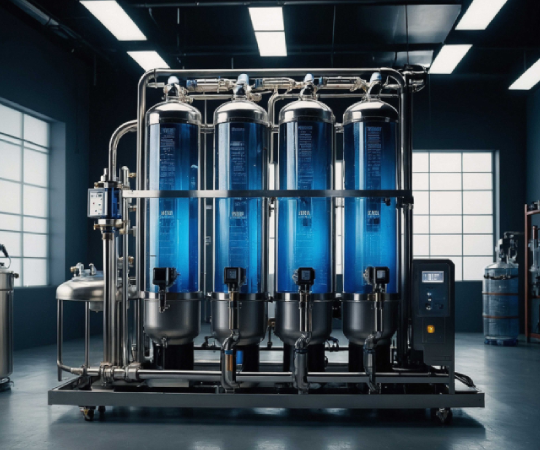- By Admin
- 24 Aug 2025
- ETP Plant
Comprehensive Water and Wastewater Treatment Technologies for Sustainable Potable Water Production and Distribution
Potable water industries have long been essential to India's health and development, ensuring safe drinking water for both urban and rural populations. In Maharashtra, a state known for its industrial growth and rising population, the demand for clean water has grown exponentially. The role of potable water industries, ranging from bottled water units to large-scale municipal water treatment plants, is integral in maintaining public health standards. As the water treatment sector expands, its challenges evolve, with the need for efficient water quality management and sustainable wastewater treatment at the forefront.
Water is a critical resource that sustains life, but its treatment and management for potable uses must adhere to rigorous quality standards. Technologies like Reverse Osmosis (RO), UV filtration, and ozone disinfection are crucial in making water safe for consumption. For industries in Maharashtra, water treatment goes beyond purification—it involves sophisticated systems for sourcing, filtration, packaging, and maintaining the water quality throughout the supply chain. These industries ensure that water meets both national and international standards while facing mounting pressure to manage wastewater effectively.
"Water is the cornerstone of industrial productivity. In boiler feed industries, its quality directly influences the lifespan and efficiency of operations. With proper treatment, water becomes an asset, preventing corrosion, scaling, and energy losses. Every drop treated well adds to operational excellence, ensuring sustainability in every process."
High-Quality Water for Production, Packaging, and Distribution
In potable water industries, the purity of water is the highest priority. Raw water, whether sourced from rivers, lakes, or reservoirs, must undergo multiple levels of treatment before it is fit for human consumption. These treatments involve advanced filtration, chemical dosing, and sterilisation methods, ensuring that the final product adheres to the safe drinking water standards set by regulatory authorities like the Bureau of Indian Standards (BIS) and the World Health Organisation (WHO).
The treated water is not only used for packaging and distribution but also for various operational processes like cleaning equipment, sterilising pipes, and maintaining hygiene within production facilities. Water also plays a vital role in ensuring operational efficiency. Filtration systems, backwashing processes, and the maintenance of machinery rely on water to stay clean and prevent contamination. Without advanced water treatment, industries would not be able to meet the stringent quality requirements that ensure public health safety.


Wastewater Generation in Potable Water Treatment Plants
While potable water industries work tirelessly to produce clean water, their operations generate significant volumes of wastewater. During the filtration process, systems like sand and multimedia filters require periodic backwashing to flush out accumulated contaminants. This backwash water, rich in sediment and organic matter, must be treated before it can be safely discarded or reused.
Additionally, the water used in the cleaning and sterilising of tanks, pipelines, and equipment is often laden with detergents, sanitisers, and suspended solids. Even though the volumes of wastewater produced may vary from one plant to another, it is essential to treat this water properly to avoid environmental contamination and health risks. In facilities aiming for Zero Liquid Discharge (ZLD), wastewater treatment becomes even more crucial to ensure that every drop of water is utilised effectively.
Treatment Technologies for Managing Wastewater in Potable Water Plants
Potable water industries commonly employ Effluent Treatment Plants (ETPs) to handle wastewater generated during treatment and cleaning processes. ETPs remove suspended solids, chemical residues, and pathogens, ensuring that the effluent meets environmental discharge standards or can be reused within the plant for purposes such as cleaning or landscaping.
Advanced treatment systems like Reverse Osmosis (RO) and membrane bioreactors (MBRs) help manage concentrated waste like RO reject water, which contains high levels of salts and other impurities. Additionally, techniques such as sedimentation, filtration, and disinfection are used to treat wastewater streams, reducing their environmental impact. The goal is to recycle as much water as possible, minimising both waste and reliance on external freshwater sources.
Smart Water Technologies for Efficient Management
With the growing focus on sustainability, potable water industries are increasingly adopting smart technologies for water treatment and management. Automation systems, coupled with real-time monitoring tools, allow operators to track key water quality parameters such as turbidity, Total Dissolved Solids (TDS), and microbial content. These technologies help industries adjust processes immediately when water quality drops, ensuring compliance with regulatory standards.
By incorporating systems like Nanofiltration (NF), Ultrafiltration (UF), and Ozonation, plants can treat and reuse water more efficiently, reducing waste and minimising the environmental footprint. These innovations are part of a broader trend in the water treatment industry to embrace resource recovery and sustainability, ensuring that water remains a renewable resource rather than a finite one.
Tailored Water Treatment Solutions for Potable Water Industries
To meet the unique needs of potable water industries, customised water treatment solutions are essential. Each water source presents distinct challenges, whether related to the chemical composition of the water or the operational scale of the plant. We specialise in delivering end-to-end solutions for water and wastewater management, from consulting and design to installation and maintenance.
Our team works closely with potable water industries to develop solutions that meet the strictest water quality standards. Whether it's an STP for treating sewage, an ETP for process effluents, or a WTP for purifying raw water, we provide tailored systems that ensure compliance, efficiency, and cost-effectiveness. We also offer real-time monitoring systems, which help optimise plant performance and reduce downtime, making operations more sustainable in the long term.
Summary And Conclusion
The potable water industry plays a vital role in maintaining public health by providing clean and safe drinking water. However, the challenges of ensuring water quality and managing wastewater are significant. By implementing advanced treatment technologies like RO, UV disinfection, and ETPs, potable water industries can maintain high standards while minimising environmental impact. Smart automation and real-time monitoring further optimise water management processes, ensuring efficiency and compliance. With tailored solutions, we support potable water industries in achieving sustainability, reducing dependence on external water sources, and meeting regulatory requirements, ensuring a reliable and safe water supply for communities.































































